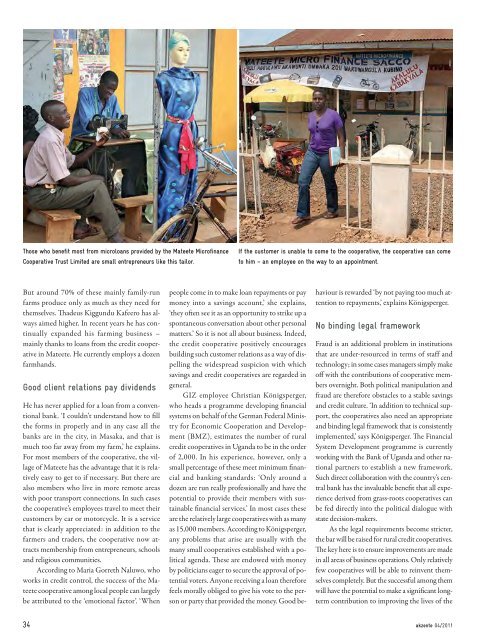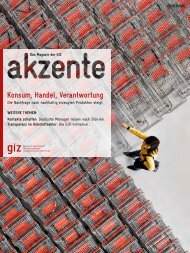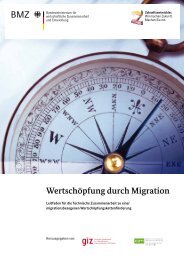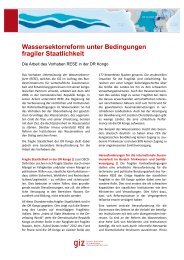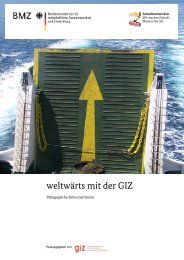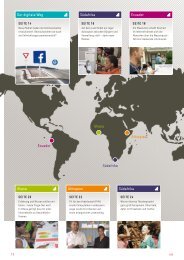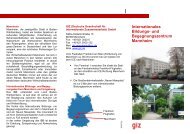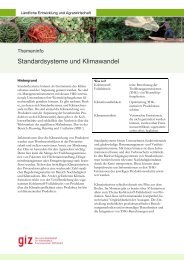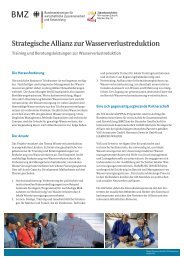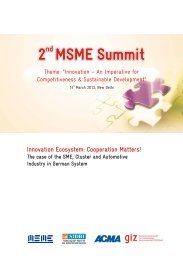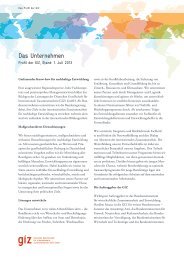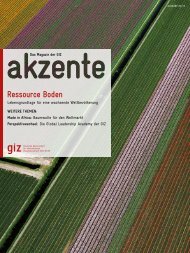Complete issue (pdf, 7520.08 MB, EN) - GIZ
Complete issue (pdf, 7520.08 MB, EN) - GIZ
Complete issue (pdf, 7520.08 MB, EN) - GIZ
Create successful ePaper yourself
Turn your PDF publications into a flip-book with our unique Google optimized e-Paper software.
those who benefit most from microloans provided by the mateete microfinance<br />
cooperative trust Limited are small entrepreneurs like this tailor.<br />
But around 70% of these mainly family-run<br />
farms produce only as much as they need for<br />
themselves. Thadeus Kiggundu Kafeero has always<br />
aimed higher. In recent years he has continually<br />
expanded his farming business –<br />
mainly thanks to loans from the credit cooperative<br />
in Mateete. He currently employs a dozen<br />
farmhands.<br />
good client relations pay dividends<br />
He has never applied for a loan from a conventional<br />
bank. ‘I couldn’t understand how to fill<br />
the forms in properly and in any case all the<br />
banks are in the city, in Masaka, and that is<br />
much too far away from my farm,’ he explains.<br />
For most members of the cooperative, the village<br />
of Mateete has the advantage that it is relatively<br />
easy to get to if necessary. But there are<br />
also members who live in more remote areas<br />
with poor transport connections. In such cases<br />
the cooperative’s employees travel to meet their<br />
customers by car or motorcycle. It is a service<br />
that is clearly appreciated: in addition to the<br />
farmers and traders, the cooperative now attracts<br />
membership from entrepreneurs, schools<br />
and religious communities.<br />
According to Maria Gorreth Naluwo, who<br />
works in credit control, the success of the Mateete<br />
cooperative among local people can largely<br />
be attributed to the ‘emotional factor’. ‘When<br />
if the customer is unable to come to the cooperative, the cooperative can come<br />
to him – an employee on the way to an appointment.<br />
people come in to make loan repayments or pay<br />
money into a savings account,’ she explains,<br />
‘they often see it as an opportunity to strike up a<br />
spontaneous conversation about other personal<br />
matters.’ So it is not all about business. Indeed,<br />
the credit cooperative positively encourages<br />
building such customer relations as a way of dispelling<br />
the widespread suspicion with which<br />
savings and credit cooperatives are regarded in<br />
general.<br />
<strong>GIZ</strong> employee Christian Königsperger,<br />
who heads a programme developing financial<br />
systems on behalf of the German Federal Ministry<br />
for Economic Cooperation and Development<br />
(BMZ), estimates the number of rural<br />
credit cooperatives in Uganda to be in the order<br />
of 2,000. In his experience, however, only a<br />
small percentage of these meet minimum financial<br />
and banking standards: ‘Only around a<br />
dozen are run really professionally and have the<br />
potential to provide their members with sustainable<br />
financial services.’ In most cases these<br />
are the relatively large cooperatives with as many<br />
as 15,000 members. According to Königsperger,<br />
any problems that arise are usually with the<br />
many small cooperatives established with a political<br />
agenda. These are endowed with money<br />
by politicians eager to secure the approval of potential<br />
voters. Anyone receiving a loan therefore<br />
feels morally obliged to give his vote to the person<br />
or party that provided the money. Good be-<br />
haviour is rewarded ‘by not paying too much attention<br />
to repayments,’ explains Königsperger.<br />
no binding legal framework<br />
Fraud is an additional problem in institutions<br />
that are under-resourced in terms of staff and<br />
technology; in some cases managers simply make<br />
off with the contributions of cooperative members<br />
overnight. Both political manipulation and<br />
fraud are therefore obstacles to a stable savings<br />
and credit culture. ‘In addition to technical support,<br />
the cooperatives also need an appropriate<br />
and binding legal framework that is consistently<br />
implemented,’ says Königsperger. The Financial<br />
System Development programme is currently<br />
working with the Bank of Uganda and other national<br />
partners to establish a new framework.<br />
Such direct collaboration with the country’s central<br />
bank has the invaluable benefit that all experience<br />
derived from grass-roots cooperatives can<br />
be fed directly into the political dialogue with<br />
state decision-makers.<br />
As the legal requirements become stricter,<br />
the bar will be raised for rural credit cooperatives.<br />
The key here is to ensure improvements are made<br />
in all areas of business operations. Only relatively<br />
few cooperatives will be able to reinvent themselves<br />
completely. But the successful among them<br />
will have the potential to make a significant longterm<br />
contribution to improving the lives of the<br />
34 akzente 04/2011


